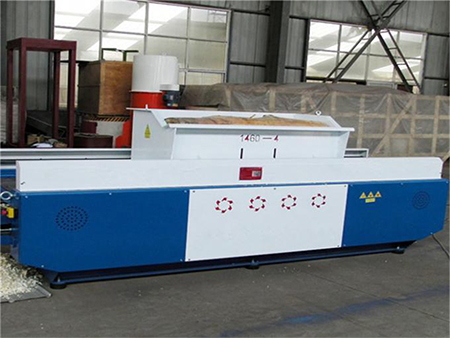NEWS
wood shaving machine for sale
Writer: admin Time:2023-12-02 15:24:43 Browse:168℃
Wood shaving machines for animal bedding are designed to process wood into thin shavings suitable
for use in animal stalls, particularly for livestock like horses, cows, and poultry. These shavings serve as
bedding material to provide comfort, insulation, and absorbency. When choosing a wood shaving machine
for animal bedding, consider the following factors:
1. Capacity: Ensure that the machine has the capacity to meet your required production volume.
Industrial machines are often preferred for large-scale operations.
2. Shaving Size: The machine should be capable of producing shavings of the desired size and thickness.
Different animals may have specific bedding requirements, so the machine should offer flexibility in shaving size.
3. Adjustability: Look for a machine that allows you to adjust settings such as thickness, length, and possibly
the density of the produced shavings. This flexibility ensures that you can customize the bedding material based
on your needs.
4. Dust Control: A good wood shaving machine for animal bedding should have features to minimize dust generation.
Dust-free bedding is crucial for the respiratory health of animals.
5. Material Compatibility: Ensure that the machine is suitable for processing the type of wood available in your region.
Some machines may be designed for specific wood types or may handle a variety of wood materials.
6. Durability and Maintenance: Choose a machine that is durable and easy to maintain. Regular maintenance
is essential to keep the machine in optimal working condition.
7. Safety Features: Safety should be a priority. The machine should have safety features such as emergency stops,
protective guards, and user-friendly controls.

8. Brand Reputation: Consider purchasing from reputable manufacturers with a history of producing quality
wood shaving machines. Read reviews and gather feedback from other users if possible.
9. Cost: Compare prices from different suppliers and manufacturers, taking into account not only the upfront
cost but also any additional costs associated with maintenance and operation.
It's advisable to consult with suppliers or manufacturers directly to discuss your specific requirements and
receive recommendations based on your needs. Additionally, inquire about warranty options and after-sales support.
CATEGORIES
LATEST NEWS
- 2712 wood shaving machine
- wood sawdust machine is ready to be shipped abroad
- Yamei wood sawdust machine won CE certification and entered the international market
- Yamei new shaving machine 2090 - 2 tons per hour
- Yamei Machinery launches a new pet bedding machine, leading the new trend of the industry
CONTACT US
Mobile/WeChat/WhatsApp : +8615803835864
E-mail : 15036162431@163.com
Add: Long Jiang West Road 19,Industry Gathering Area,Shang Jie,Zhengzhou,Henan,China